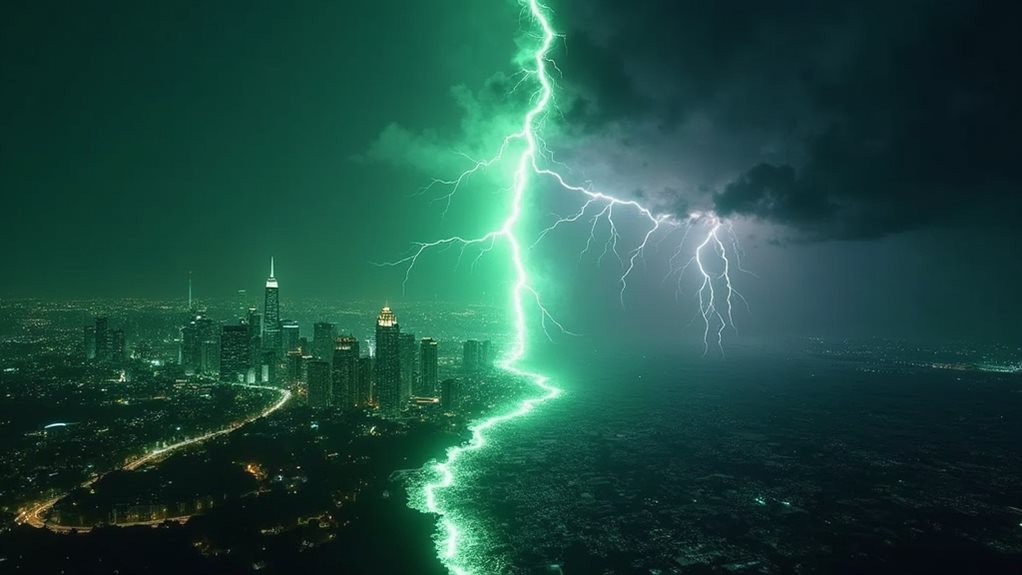Cryptocurrency investments pack both incredible potential and brutal risks. Early investors have scored life-changing wealth through Bitcoin's meteoric rise past $100,000, while others lost everything to hacks and scams totaling $2.2 billion in 2024 alone. The 24/7 global market offers unprecedented access to anyone with a smartphone, but wild price swings and zero government safety nets make it a financial rollercoaster. The unregulated "wild west" environment draws both fortune seekers and fraudsters. The deeper story reveals even more surprises.

While traditional investors clutch their pearls over market volatility, cryptocurrency has exploded onto the financial scene like a digital tsunami. This decentralized form of digital money, secured by cryptography and running on blockchain technology, has turned the financial world upside down. No banks. No middlemen. Just pure, peer-to-peer transactions happening 24/7 across the globe.
Let's face it – the potential gains are mind-boggling. Some early investors have seen returns that would make Wall Street veterans weep into their morning coffee. The accessibility is remarkable too. Got a smartphone and internet connection? Congratulations, you're in the game. No fancy suit or corner office required. This democratization of finance has opened doors for the unbanked populations worldwide, giving them access to financial services they've never had before. Bitcoin's meteoric rise to over $100,000 in December 2024 has only fueled greater interest in crypto investments.
Cryptocurrency transforms average investors into market players, bypassing traditional gatekeepers and unlocking wealth-building opportunities for anyone with internet access.
But here's where things get messy. Cryptocurrency's wild price swings can turn millionaires into paupers faster than you can say "blockchain." No government backing, no safety net – just pure market sentiment driving prices up and down like a roller coaster on steroids. Lost your private key? Too bad. Those coins are now floating in digital limbo forever. And don't even get started on the hacks and scams. When crypto exchanges get hit, they get hit hard. Popular platforms like Bitcoin exemplify how mining validates transactions through complex mathematical computations. Criminal groups have stolen an astounding 2.2 billion dollars through cryptocurrency hacks in 2024 alone.
The environmental impact is another thorny issue. Cryptocurrency mining gobbles up electricity like there's no tomorrow. The carbon footprint of some cryptocurrencies could make an environmentalist faint. Yet proponents argue that innovation in mining technology and alternative cryptocurrencies could help address these concerns. With the recent Bitcoin halving reducing rewards to 3.125 BTC per block, miners are increasingly focused on finding cost-effective energy solutions and joining mining pools for consistent returns.
The regulatory landscape is about as clear as mud. Different countries have different rules – or no rules at all. This regulatory wild west means investors are largely on their own, steering through a maze of uncertainty. Market manipulation? It happens. Fraud? You bet. The lack of oversight is both a blessing and a curse.
Looking ahead, cryptocurrency's future is as unpredictable as its price charts. Major financial institutions are dipping their toes in the crypto waters, while technology keeps evolving to address current limitations. The integration of cryptocurrencies into mainstream finance continues, despite the skeptics and naysayers.
But the challenges remain significant – volatility, environmental concerns, and regulatory uncertainty aren't going away anytime soon. Welcome to the future of money – it's exciting, terrifying, and absolutely unpredictable.
Frequently Asked Questions
How Do I Choose the Right Cryptocurrency Exchange Platform?
Selecting a crypto exchange boils down to core factors.
Security comes first – robust encryption and two-factor authentication are non-negotiable.
Next up: liquidity and trading volume. Higher numbers mean smoother trades.
User experience matters too – a clunky interface can wreck trading plans.
Fees make or break profits, so compare those structures carefully.
Finally, regulatory compliance keeps things legit. No shortcuts here, folks.
Each platform has its quirks.
What Security Measures Should I Take to Protect My Crypto Investments?
Securing crypto investments requires multiple layers of defense.
Hardware wallets like Ledger or Trezor keep assets offline and safe from hackers.
Two-factor authentication is non-negotiable – period.
Smart investors use multi-signature wallets, requiring multiple approvals for transfers.
Regular software updates patch vulnerabilities.
Phishing scams? They're everywhere.
Transaction verification is essential – one wrong digit means bye-bye coins.
Backups matter too – because losing access hurts worse than market crashes.
When Is the Best Time to Enter the Cryptocurrency Market?
Market timing varies, but patterns emerge.
Early morning hours (12 AM – 6 AM UTC) show lower trading volumes – less competition.
Mondays? Often cheaper prices.
Weekdays beat weekends for activity, especially during US market hours (9:30 AM – 4 PM EST).
Autumn and spring typically see more action.
But here's the kicker: crypto markets run 24/7, and volatility can strike anytime.
Even the "pros" can't perfectly time this wild ride.
How Much Money Should I Initially Invest in Cryptocurrencies?
Initial crypto investments vary widely based on personal circumstances.
Most experts point to 5% of one's investment portfolio as a reasonable maximum allocation.
For beginners, starting small – like $100 – helps learn the ropes without major risk.
Dollar-cost averaging spreads out the risk even further.
The crypto market's notorious volatility means investors should never put in more than they can afford to lose.
Simple as that.
Which Cryptocurrency Wallets Are Most Reliable for Long-Term Storage?
Hardware wallets like Ledger and Trezor dominate secure long-term storage.
They're basically tiny fortresses for crypto. Cold storage means hackers can't touch those digital assets – period.
Multi-signature wallets add extra protection, requiring multiple approvals for transfers.
Paper wallets work too, but they're old school and risky (one coffee spill, goodbye crypto).
For serious long-term hodling, hardware wallets paired with secure backups are the gold standard.









